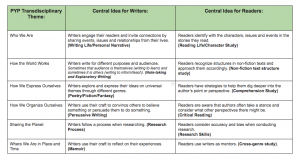When I first started working at my #IBPYP school, I was already a long-time TCRWP enthusiast. Having worked in a district in NYC at a time when we were mostly literacy-focused, I spent a lot of time at TC and with TC staff developers. My students have a much better experience in my class as a result of this.
The faculty at the project get to spend all day, every day, thinking about literacy and how best to support development in our young learners. Their insights and focus are invaluable, and I draw from them every day in my practice. I continue to learn from their work and find ways to apply that learning to my context as a PYP teacher.
I am on an ongoing quest to find the most powerful way to implement what we know works from TCRWP and from PYP. I know that there are schools out there who run the PYP and TCRWP side by side. The philosophies match in so many ways. But for a long time, I’ve been thinking that running them together is not enough. I wonder, is it truly supporting genuine, student-centered #inquiry? Are we grounding the learning in carefully selected concepts? What about when schools teach TCRWP units of study as they are published by Heinemann? Experienced workshop teachers can attest to the magic that happens when readers and writers get to experience the workshop approach but I worry about indoctrination. Even when something works well, isn’t it our responsibility to ask ourselves how could we make it even better? Especially when we work under multiple belief systems?
Looking back, one of the ways I have worked to integrate my reading and writing workshops into my program of inquiry is by lining up the reading and writing units with the transdisciplinary themes. I saw this as one way I could ground my reading and writing units in specific concepts.
Here’s an example of how I fleshed these out for the purposes of my own planning:

For the past several years, I have planned out my reading and writing units this way, starting with the transdisciplinary theme, then I move on to generate “central ideas” and “lines of inquiry” for each workshop. I then plan out the related concepts and possible/probable skills that will be taught within the conceptual constructs of the unit. This varies from year to year depending on the student’s prior experiences, as well as the evolving program of inquiry. In most cases, this creates opportunities for my students to make connections to the units of inquiry. Sometimes it doesn’t and the degree to which always varies. This makes me think that I need to continue on my quest to make my program even more transdisciplinary.
This year, when planning the “what” of my curriculum, my plan is to try to move away from fitting my “units of study” into my program of inquiry. I hope to work towards building a truly concept-based language curriculum that is open enough to student-direction. I don’t plan to abandon the valuable lessons from the TCRWP, rather I will take with me some of the core philosophies and attitudes, as well as the time-tested practices and structures and apply those to the “how” of my curriculum after I have planned the “what.”
As always, I’m on the lookout for collaborators and resources!
Thanks Jen! You’ve changed my thinking. I’m going to use your table and mull it over. I appreciate it.
Kathy